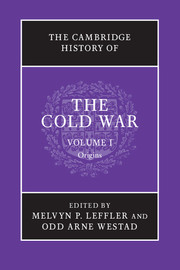Book contents
- Frontmatter
- 1 The Cold War and the international history of the twentieth century
- 2 Ideology and the origins of the Cold War, 1917–1962
- 3 The world economy and the Cold War in the middle of the twentieth century
- 4 The emergence of an American grand strategy, 1945–1952
- 5 The Soviet Union and the world, 1944–1953
- 6 Britain and the Cold War, 1945–1955
- 7 The division of Germany, 1945–1949
- 8 The Marshall Plan and the creation of the West
- 9 The Sovietization of Eastern Europe, 1944–1953
- 10 The Cold War in the Balkans, 1945–1956
- 11 The birth of the People’s Republic of China and the road to the Korean War
- 12 Japan, the United States, and the Cold War, 1945–1960
- 13 The Korean War
- 14 US national security policy from Eisenhower to Kennedy
- 15 Soviet foreign policy, 1953–1962
- 16 East Central Europe, 1953–1956
- 17 The Sino-Soviet alliance and the Cold War in Asia, 1954–1962
- 18 Nuclear weapons and the escalation of the Cold War, 1945–1962
- 19 Culture and the Cold War in Europe
- 20 Cold War mobilization and domestic politics: the United States
- 21 Cold War mobilisation and domestic politics: the Soviet Union
- 22 Decolonization, the global South, and the Cold War, 1919–1962
- 23 Oil, resources, and the Cold War, 1945–1962
- Bibliographical essay
- Index
- References
11 - The birth of the People’s Republic of China and the road to the Korean War
Published online by Cambridge University Press: 28 September 2010
- Frontmatter
- 1 The Cold War and the international history of the twentieth century
- 2 Ideology and the origins of the Cold War, 1917–1962
- 3 The world economy and the Cold War in the middle of the twentieth century
- 4 The emergence of an American grand strategy, 1945–1952
- 5 The Soviet Union and the world, 1944–1953
- 6 Britain and the Cold War, 1945–1955
- 7 The division of Germany, 1945–1949
- 8 The Marshall Plan and the creation of the West
- 9 The Sovietization of Eastern Europe, 1944–1953
- 10 The Cold War in the Balkans, 1945–1956
- 11 The birth of the People’s Republic of China and the road to the Korean War
- 12 Japan, the United States, and the Cold War, 1945–1960
- 13 The Korean War
- 14 US national security policy from Eisenhower to Kennedy
- 15 Soviet foreign policy, 1953–1962
- 16 East Central Europe, 1953–1956
- 17 The Sino-Soviet alliance and the Cold War in Asia, 1954–1962
- 18 Nuclear weapons and the escalation of the Cold War, 1945–1962
- 19 Culture and the Cold War in Europe
- 20 Cold War mobilization and domestic politics: the United States
- 21 Cold War mobilisation and domestic politics: the Soviet Union
- 22 Decolonization, the global South, and the Cold War, 1919–1962
- 23 Oil, resources, and the Cold War, 1945–1962
- Bibliographical essay
- Index
- References
Summary
The international order in East Asia changed dramatically following the conclusion of the Sino-Japanese War in 1945; the two most consequential events of this period were the birth of the People’s Republic of China (PRC) on October 1, 1949, and, one year later, the PRC’s entry into a three-year military contest against the United States in the Korean War, 1950–53. These developments confirmed the spread of the Cold War to East Asia and determined the long-term pattern of confrontation between the United States and the Soviet Union in the region. For China, the decision to ally with the USSR and enter the Korean War meant that there was no alternative but to man Asia’s Cold War frontier against US encroachment. All developments accompanying the birth of the PRC and its choice of foreign policies — especially the decision to enter the Korean War — were deeply rooted in China’s domestic politics, and it can be safely concluded that the leaders of the Chinese Communist Party (CCP) made coherent choices when confronted with international crises. Yet the contest between the United States and the Soviet Union rapidly grew into the most significant characteristic of the postwar international system, and greatly infiuenced the future of China. From 1945, it was the interaction between four actors — the United States, the USSR, the Guomindang (GMD), and the CCP — that constituted the fundamental interface between Chinese domestic politics and the international system. It was also this dynamic that pushed China into deeper and deeper involvement in the Cold War.
- Type
- Chapter
- Information
- The Cambridge History of the Cold War , pp. 221 - 243Publisher: Cambridge University PressPrint publication year: 2010
References
- 3
- Cited by



